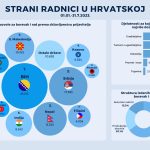May 7, 2020 – TCN is delighted to welcome Courtney Long to the writing team. With a BA in Asian studies and currently studying Mandarin in Zagreb, some thoughts on the relationship between Croatia and China. Welcome, Number 151!
Last month, a majority of European nations agreed to implement strict quarantine measures to contain the spread of COVID-19.
The decision reflects a worldwide movement intended to reduce the COVID-19 infection rate. As of this writing, there were already 1,436,617 patient cases across Europe and 139,586 deaths, according to recent reports from Worldmeter’s COVID-19 data. In Croatia, there have been 2,088 infected patients as of May 3rd and the death toll is now at 77.
A TCN article published on Monday, April 13th 2020 explained that Croatia has recently obtained 12.5 tonnes of protective equipment from China. This procurement is the result of an agreement made between Prime Minister Andrej Plenković and Chinese Premier Li Keqiang.
On its surface, this act of cooperation between countries during a global pandemic seems encouraging. In a crisis, we are much stronger as a united force than we are as divided nations who cast blame on each other. Unfortunately, mutual cooperation can only succeed as long as the international cooperating partners are honest and forthcoming with the information they have.
Sadly, this has not been the case with China. We now know that the government of Xi Jinping threatened both Chinese medical professionals and citizens, insisting that they remain silent about their knowledge of the Corona virus, its origins, and the circumstances surrounding the initial outbreak. This insistence on secrecy and the related citizen detentions and interrogations by the CCP led directly to the situation in which we currently find ourselves – one that is proving to be both socially and economically devastating.
Chinese citizens who defied the authorities and exposed what they knew to anyone who would listen have now disappeared, and news organizations from around the world have enquired about the whereabouts of whistle-blowers, some of the most notable being Dr. Ai Fen and citizen journalists Li Zehua, Chen Qiushi, and Fang Bin. To date, these people’s families and friends are uncertain of their respective fates.
It appears now that Mr. Xi and the CCP are trying to worm their way back into the international community’s good graces by practicing “mask diplomacy” – an organized initiative involving the donation (or in some cases the sale) of Chinese medical supplies to the many nations affected by the Wuhan virus. Recent reports have revealed that the Dutch government has recalled 600,000 facemasks from China for being defective, and other European nations are facing similar problems.
China’s Ministry of Foreign Affairs responded to Europe’s complaints with a tweet, stating that recipients should have double-checked the orders before placing them. This is an arrogant and bald-faced addition of insult to injury, and it begs the question why Europe’s politicians, including Mr. Plenkovic, would choose to accept medical supplies from China under these circumstances.
It appears that not only is accepting – or in worse cases, purchasing – medical supplies from China a risk with very little return on investment, but also that the countries who negotiated for the delivery of Chinese medical supplies are learning the meaning of “buyer beware.” India obtained personal protection equipment (PPE) from China and, like Europe, found that it had been given faulty supplies that failed quality testing. According to a recent news report in India, “the term ‘Made in China’ is used [there] as a synonym for defective products.”
Meanwhile in the UK, government officials are scrambling to reclaim the £16 million they spent purchasing Chinese test kits that are now known to give inaccurate results. It’s puzzling to consider that each of these countries has willingly turned to China for a hand-out, with predictable results.
For Croatia, maintaining amicable relations with the Chinese government may be viewed as a practical strategy for now, especially as China is helping this country to construct the Pelješac Bridge. But our government must ask itself what price is to be imposed on it – and on all Croatians – as a result of its willingness to compromise basic standards of justice and decency.
Ideally, Croatia and China will continue to have a mutually beneficial partnership. However, as WION news reporter Palki Sharma observed, now that social distancing is in effect, perhaps it’s time for the world to practice economic distancing with China. Knowing that Wuhan’s wet markets are one again open for business, one could guess either that the CCP has learned nothing from this calamity or that it simply doesn’t care. With this in mind, now may be the time for other nations, including Croatia, to focus on redeveloping their domestic markets, instead of relying on one country with a monopoly on production.
Croatia has openly (and repeatedly) expressed frustration over the struggle to keep its own citizens in their home country, yet this crisis could present the perfect opportunity to incentivize unity among Croatians by engaging them in creating and distributing their own medical supplies, as well as other products, rather than relying on China as a ubiquitous crutch.
Economies around the world are anticipating a depression, and Croatia’s heavy dependence on revenue from tourism has left many people worried about the devastating consequences the pandemic is likely to have on travel. Unfortunately, Croatia’s pride in its coast has given it a case of tunnel vision, resulting in focused investment in the tourist sector at the expense of other industries. Croatia has put most of its eggs into one basket, and now it’s panicking. However, with every crisis there is an opportunity, and Croatia now has a chance to invest in domestic industries, just as Japan and the United States are intending to do.
For Croatia, two likely outcomes are possible. One is that Croatian lawmakers may actually move to strengthen industries here, providing more job opportunities locally and persuading Croatian citizens to remain and return to their homeland. Alternatively, our politicians can maintain the status quo, keeping trade deals with China and scrambling to promote tourism in time for summer. If they choose the latter, they’ll have to simply hope that their decision works in Croatia’s favour while the rest of us nervously wait for the results to unfold. For now, all we can do is be hopeful and wait.







